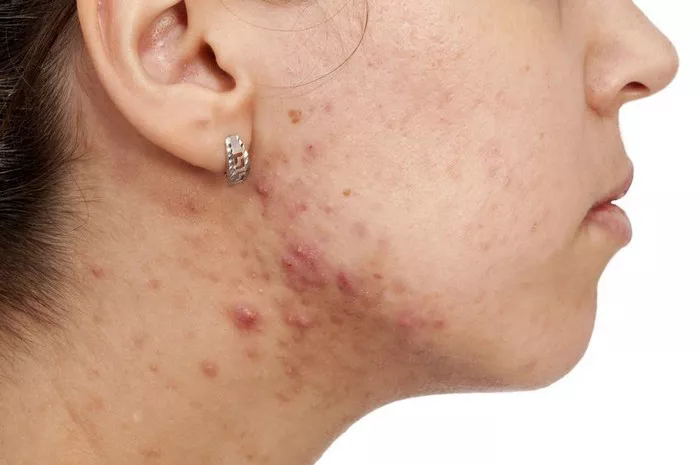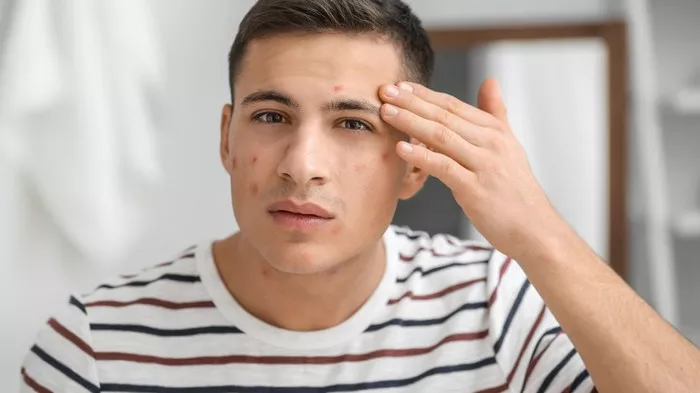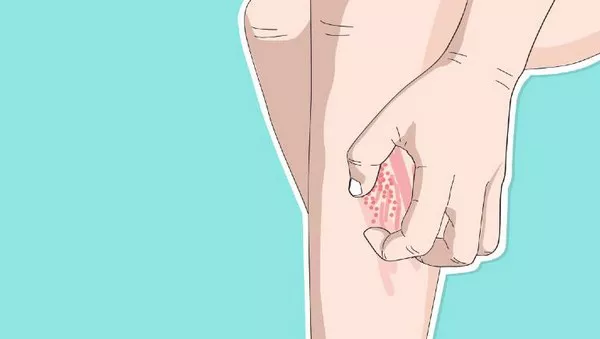Skin flare-ups are common and can occur for many reasons. When the skin flares up, it can become red, irritated, dry, itchy, or inflamed. These flare-ups can be linked to various factors, such as allergies, environmental triggers, skin conditions, or even stress. Understanding the causes of skin flare-ups is important in managing them effectively.
Common Causes of Skin Flare-Ups
Several factors contribute to skin flare-ups. These can range from external triggers to underlying medical conditions. Let’s explore the most common causes.
1. Allergies
Allergic reactions are a common cause of skin flare-ups. Skin allergies can occur when the body reacts to substances like certain foods, medications, or environmental factors. Common allergens include pollen, pet dander, mold, and dust mites. When your skin comes into contact with an allergen, it can cause inflammation, redness, swelling, and itching. This is particularly true for people with conditions like eczema or hives.
Food allergies can also trigger skin reactions. Common foods that cause skin flare-ups include dairy, nuts, and shellfish. These foods may lead to conditions like hives or rashes. If you suspect that food allergies are affecting your skin, it’s important to consult with a healthcare professional for testing.
2. Irritants
Certain substances can irritate the skin and cause flare-ups. These irritants may include harsh chemicals in soaps, lotions, or detergents. Some people may also have sensitive skin that reacts to fragrances or artificial colors in skincare products. These irritants can cause the skin to become red, itchy, and inflamed.
Environmental pollutants, such as smoke or air pollution, can also trigger skin flare-ups. They can cause irritation and dryness. Prolonged exposure to these pollutants can weaken the skin’s protective barrier, making it more susceptible to flare-ups.
3. Skin Conditions
Several chronic skin conditions can lead to flare-ups. These include eczema, psoriasis, rosacea, and acne. Each of these conditions has specific triggers that can worsen symptoms and cause flare-ups.
Eczema: Eczema, also known as atopic dermatitis, is a common skin condition that leads to itchy, inflamed skin. Eczema flare-ups can be triggered by allergens, dry skin, heat, and stress.
Psoriasis: Psoriasis is an autoimmune condition that causes skin cells to multiply too quickly. This results in scaly patches on the skin. Psoriasis flare-ups can be triggered by stress, infections, certain medications, or even cold weather.
Rosacea: Rosacea is a skin condition that causes redness, swelling, and visible blood vessels on the face. Flare-ups of rosacea can be triggered by spicy foods, alcohol, extreme temperatures, or sun exposure.
Acne: Acne flare-ups occur when pores become clogged with oil, dead skin cells, and bacteria. This can lead to pimples, blackheads, and cysts. Hormonal changes, stress, and certain skincare products can all trigger acne flare-ups.
4. Dry Skin
Dry skin is another common cause of flare-ups. When your skin lacks moisture, it can become tight, flaky, and irritated. This can lead to itching, redness, and even cracking of the skin. Dry skin is particularly common in colder weather when the air is drier, but it can occur at any time of year.
Exposure to hot water, frequent washing, or harsh skincare products can also contribute to dry skin. People with conditions like eczema or psoriasis are more likely to experience dry skin flare-ups.
5. Hormonal Changes
Hormonal changes play a significant role in skin health. Hormonal fluctuations can trigger skin flare-ups, especially in women. Puberty, pregnancy, and menopause are all periods when hormonal changes are common, and they can affect the skin.
For example, during puberty, increased oil production due to hormonal changes can lead to acne flare-ups. Pregnancy can also cause changes in the skin, such as melasma (dark patches) or acne. Menopause often results in drier skin and increased sensitivity, which can lead to flare-ups of existing skin conditions.
6. Stress
Stress is known to impact many aspects of our health, and the skin is no exception. When you’re stressed, your body produces more cortisol, a hormone that can lead to inflammation. This can trigger flare-ups in conditions like eczema, psoriasis, and acne.
In addition to affecting pre-existing skin conditions, stress can also weaken the skin’s barrier, making it more prone to irritation and sensitivity. Managing stress through relaxation techniques, exercise, or mindfulness can help reduce skin flare-ups.
7. Weather Conditions
The weather has a direct impact on skin health. Extreme temperatures, both hot and cold, can trigger flare-ups. During hot weather, the skin can become oily, which can lead to acne or rashes. High humidity can also increase sweating, leading to skin irritation and flare-ups.
Cold weather, on the other hand, can cause the skin to become dry and cracked. The drop in humidity during winter months can strip the skin of its natural oils, leading to flare-ups of conditions like eczema or psoriasis. It’s important to adjust your skincare routine to protect your skin from harsh weather conditions.
8. Infections
Infections, whether bacterial, viral, or fungal, can cause skin flare-ups. Skin infections can lead to redness, swelling, and sometimes pus-filled bumps. Conditions like impetigo (a bacterial infection), warts (a viral infection), or athlete’s foot (a fungal infection) can cause the skin to flare up.
Infections can also worsen pre-existing skin conditions. For example, a bacterial infection can cause eczema to become more inflamed, or a fungal infection can trigger psoriasis flare-ups. It’s important to treat infections promptly to avoid worsening the skin condition.
9. Medications
Certain medications can cause skin flare-ups as a side effect. These medications include antibiotics, chemotherapy drugs, and blood pressure medications. Some medications can make the skin more sensitive to sunlight, increasing the risk of sunburn and flare-ups.
If you notice a skin flare-up after starting a new medication, it’s important to speak with your doctor. They may be able to adjust the dosage or recommend an alternative treatment.
10. Diet and Lifestyle Choices
What you eat can affect your skin health. Diets high in sugar, processed foods, and unhealthy fats can contribute to inflammation in the body, which can trigger skin flare-ups. A diet rich in fruits, vegetables, and healthy fats can help support healthy skin and reduce flare-ups.
Additionally, lifestyle choices like smoking and excessive alcohol consumption can negatively impact your skin. Smoking reduces blood flow to the skin, which can lead to dryness, wrinkles, and flare-ups of skin conditions. Alcohol can dehydrate the skin and cause inflammation, which may contribute to flare-ups.
11. Sun Exposure
Sun exposure is a significant trigger for many skin conditions. While moderate sun exposure can be beneficial for vitamin D production, overexposure can lead to skin damage. Sunburns, freckles, and wrinkles can result from excessive sun exposure.
For people with skin conditions like rosacea or lupus, sun exposure can cause flare-ups. It’s essential to protect your skin from the sun by wearing sunscreen, hats, and protective clothing. Avoiding prolonged sun exposure, especially during peak hours, can help prevent flare-ups.
How to Prevent Skin Flare-Ups
Preventing skin flare-ups involves taking steps to avoid triggers and maintain healthy skin. Here are some tips for managing flare-ups:
Identify and Avoid Triggers: Keep track of what causes your skin to flare up. Whether it’s food, skincare products, or environmental factors, identifying triggers can help you avoid them.
Moisturize Regularly: Keeping your skin moisturized is crucial for preventing dryness and irritation. Use a gentle, fragrance-free moisturizer to lock in moisture and protect your skin.
Use Gentle Skincare Products: Avoid harsh soaps, fragrances, and skincare products that can irritate your skin. Choose products that are suitable for your skin type and free from harsh chemicals.
Protect Your Skin from the Sun: Use sunscreen daily, even on cloudy days. Wear hats, sunglasses, and protective clothing when outdoors.
Manage Stress: Practice stress-reduction techniques such as meditation, yoga, or deep breathing exercises to keep your skin healthy.
Eat a Balanced Diet: Eating a diet rich in antioxidants, vitamins, and healthy fats can help keep your skin healthy and prevent flare-ups.
Conclusion
Skin flare-ups are a common problem that can be caused by many factors. Identifying the root cause of your skin issues is the first step in managing flare-ups effectively. Whether it’s due to allergies, skin conditions, weather, or lifestyle choices, taking the right precautions and seeking appropriate treatment can help reduce the frequency and severity of flare-ups. If you experience persistent skin issues, it’s always a good idea to consult with a dermatologist for personalized advice and treatment options.
Related topics



























